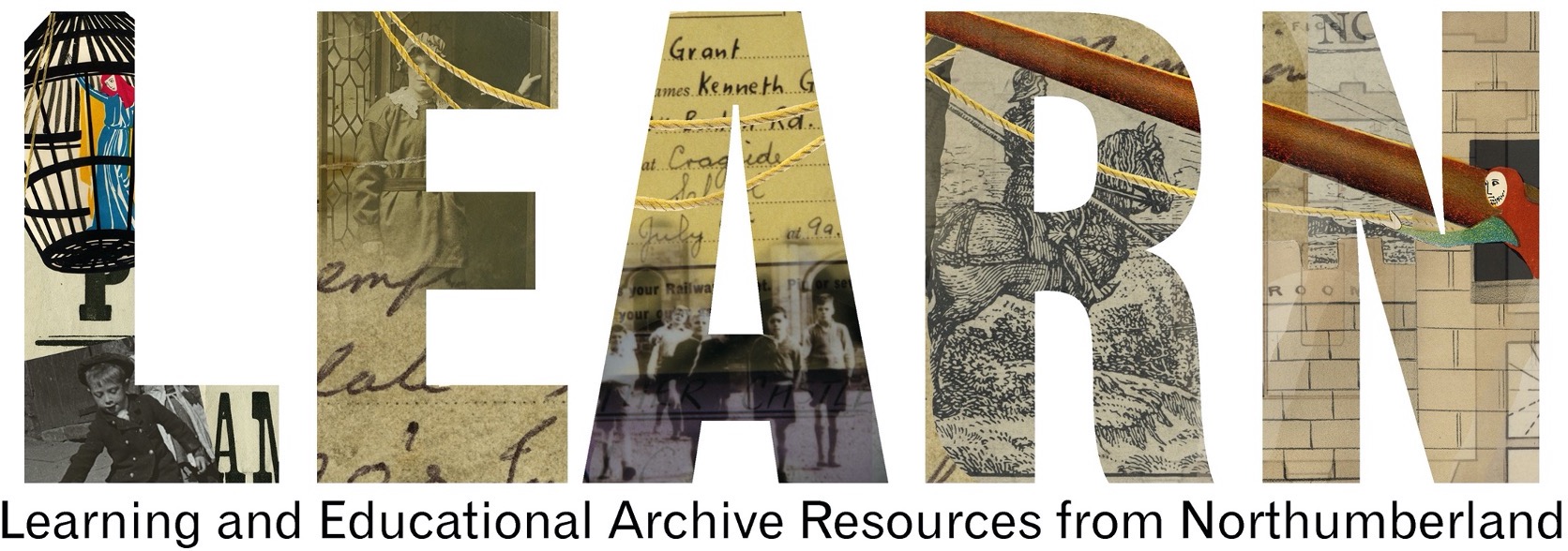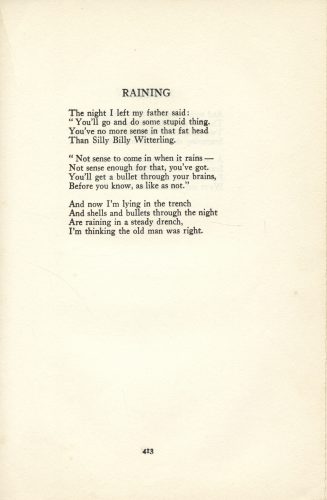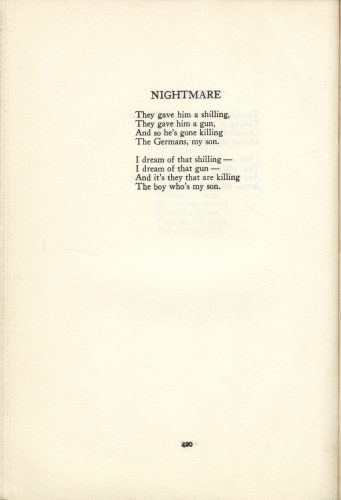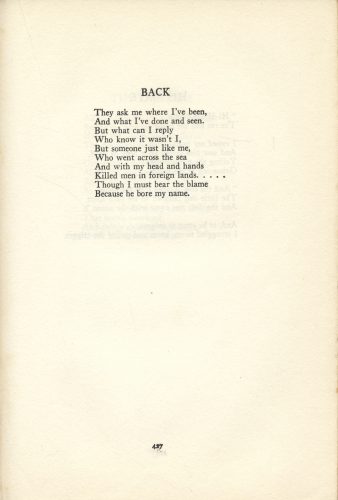Raining, Nightmare and Back – Poems by Wilfrid Wilson Gibson
Reference: NOR 01876/P/24/3
Suggested age groups: KS2, KS3, KS4, Lifelong Learners
Subject areas: History, Literacy, Art, Music
CONTEXT
Wilfrid Wilson Gibson was born in 1878 in Hexham. Wilfrid attended local schools, and later said that he wrote his first poem aged 10, about a school bully. He was close to his older sister, Elizabeth, who was also a poet. In 1901, he won a competition to have one of his poems on the base of the fountain in Hexham Market Square.
Wilfrid left Hexham for London in 1912. He lived above the famous “The Poetry Bookshop” and met a group of poets, including Wilfred Owen and Rupert Brooke. During the First World War, Wilfrid tried to join the army on a number of occasions. He was rejected as physically unfit until late 1917 when he enlisted as a Private. Wilfrid did not serve abroad and was not involved in any fighting. However, much of his war poetry is written from the point of view of a soldier in the trenches.
Wilfrid’s book of poetry “Friends”, published 1916, was dedicated to Rupert Brooke (died 1915).
At the beginning of the war, Wilfrid’s sister was a suffragist and pacifist. She wrote a number of anti-war poems (see link, below). She also signed a Christmas letter (1914) that was written by a group of leading suffragists and was addressed to the women of Germany and Austria:
Though our sons are sent to slay each other, and our hearts are torn by the cruelty of this fate, yet through pain supreme we will be true to our common womanhood. We will let no bitterness enter into this tragedy, made sacred by the life-blood of our best, nor mar with hate the heroism of their sacrifice.
(See link below for a full transcript.)
ACTIVITIES
ACTIVITY 1
Background
Wilfrid Wilson Gibson was born in 1878 in Hexham. Wilfrid attended local schools, and later said that he wrote his first poem aged 10, about a school bully. Wilfrid left Hexham for London in 1912. He lived above the famous “The Poetry Bookshop” and met a group of poets, including Wilfred Owen and Rupert Brooke. During the First World War, Wilfrid tried to join the army on a number of occasions. He was rejected as physically unfit until late 1917 when he enlisted as a Private. Wilfrid did not serve abroad and was not involved in any fighting. However, much of his war poetry is written from the point of view of a soldier in the trenches.
SEE
See: Where is Wilfrid Wilson Gibson from?
See: When did Wilfrid write his first poem?
See: Which poets did Wilfrid meet in London?
See: Why was Wilfrid rejected from joining the army?
See: Whose perspective is much of Wilfrid’s poetry written from?
THINK
Think: Why does the poet write from the perspective of soldiers in the trenches?
Think: Does knowing that the poet wrote from the perspective of a soldier in the trenches but did not serve abroad or take part in the fighting change the meaning or effect of the poems?
Think: What impression do these poems give you of the war?
Think: How accurately do you think these poems portray war?
Think: How accurately do you think these poems present the experience of the soldier?
Think: Why did war poetry have a sense of yearning for England?
DO
Do: Read some other poems written by poets who served on the front line, for example Wilfred Owen or Siegfried Sassoon. Analyse and annotate these poems to understand the meaning, structure and linguistic devices used by the poets.
Do: Write a statement comparing and contrasting Wilfrid Wilson Gibson’s poetry to the poetry of his contemporaries. Is there a difference in how war and the experience of soldiers is portrayed?
Do: In groups, debate whether or not Wilfrid should have written from the perspective of a soldier in the trenches when he had not experienced it.
Resources
https://www.poetryfoundation.org/poets/siegfried-sassoon
https://www.poetryfoundation.org/poets/wilfred-owen
http://www.warpoets.org/conflicts/great-war/wilfrid-wilson-gibson-1878-1962/
https://www.poetryfoundation.org/poets/wilfrid-wilson-gibson
https://www.bl.uk/collection-items/battle-a-collection-of-poetry-by-wilfrid-wilson-gibson
ACTIVITY 2
Background
Wilfrid Wilson Gibson was born in 1878 in Hexham. Wilfrid attended local schools, and later said that he wrote his first poem aged 10, about a school bully. Wilfrid left Hexham for London in 1912. He lived above the famous “The Poetry Bookshop” and met a group of poets, including Wilfred Owen and Rupert Brooke. During the First World War, Wilfrid tried to join the army on a number of occasions. He was rejected as physically unfit until late 1917 when he enlisted as a Private. Wilfrid did not serve abroad and was not involved in any fighting. However, much of his war poetry is written from the point of view of a soldier in the trenches.
SEE
See: When were these poems written?
See: Which conflict was taking place when these poems were written?
See: Whose perspective are the poems told from?
THINK
Think: Whose viewpoints are these poems told from?
Think: What influenced the poet to write these poems?
Think: What narrative is being told through each poem?
Think: What linguistic features are used to convey meaning in the poems?
Think: What is the form and structure of each poem?
Think: What is the purpose of each poem?
Think: How does each poem affect the reader?
DO
Do: Create a poster illustrating the narrative of each poem. Select key phrases or lines from the poem to include on the poster.
Do: Choose one poem to analyse in depth. Consider the questions from the Think section and use them to help you annotate the poem.
Do: Write a statement about your chosen poem discussing why the poet has chosen each feature to illustrate the meaning of the poem.
Do: Write a monologue from the perspective of the soldier from one of the poems. Expand on what is told in the poem to talk about his experience.
Do: Create a piece of music inspired by the descriptive language in one of the poems.
Do: Write your own poem inspired by Wilfrid Wilson Gibson’s poetry.
Resources
https://www.bl.uk/20th-century-music/articles/music-and-the-first-world-war
http://www.warpoets.org/conflicts/great-war/wilfrid-wilson-gibson-1878-1962/
https://www.poetryfoundation.org/poets/wilfrid-wilson-gibson
https://www.bl.uk/collection-items/battle-a-collection-of-poetry-by-wilfrid-wilson-gibson
ACTIVITY 3
Background
At the beginning of the war, Wilfrid’s sister Elizabeth was a suffragist and pacifist. She wrote a number of anti-war poems. She also signed a Christmas letter (1914) that was written by a group of leading suffragists and was addressed to the women of Germany and Austria:
Though our sons are sent to slay each other, and our hearts are torn by the cruelty of this fate, yet through pain supreme we will be true to our common womanhood. We will let no bitterness enter into this tragedy, made sacred by the life-blood of our best, nor mar with hate the heroism of their sacrifice.
SEE
See: What was Elizabeth described as at the beginning of the war?
See: What type of poetry did Elizabeth write during the war?
See: Who did Elizabeth sign a Christmas letter addressed to in 1914?
THINK
Think: What is a suffragist?
Think: What is a pacifist?
Think: Why might Elizabeth and other suffragist have written a Christmas letter addressed to the women of Germany and Austria?
Think: Why were some people opposed to the war?
Think: What role did women play in the war?
DO
Do: Read the 1914 Christmas letter to the women of Germany and Austria. Write a letter back to the suffragists in response to their letter.
Do: Read one of Elizabeth’s anti-war poems. Write a statement comparing and contrasting Elizabeth and Wilfrid’s poems, paying attention to the way that war and conflict are presented.
Do: Write an anti-war poem.
Do: Imagine you are a pacifist opposing the war. Write a speech condemning the war. Present your speech.
Do: Research the suffragist movement during WW1. Write a suffragist manifesto.
Do: Create a presentation showing the effect WW1 had on suffrage.
Resources
OTHER ONLINE RESOURCES
Wilfrid Wilson Gibson
War Poets website, page for Wilfrid Wilson Gibson: http://www.warpoets.org/conflicts/great-war/wilfrid-wilson-gibson-1878-1962/
Poetry Foundation website, page for Wilfrid Wilson Gibson (includes copies of some poems): https://www.poetryfoundation.org/poets/wilfrid-wilson-gibson
Judy Greenway blog, page about Wilfrid Wilson Gibson (her grandfather): http://www.judygreenway.org.uk/wp/wilfrid-gibson-biographical-information-and-timeline/
Geograph website, photograph of Wilfrid Wilson Gibson’s poem on fountain in Hexham Market Place: https://www.geograph.org.uk/photo/673058,
British Library website, page about “Battle”, a collection of poems by Wilfrid Wilson Gibson: https://www.bl.uk/collection-items/battle-a-collection-of-poetry-by-wilfrid-wilson-gibson
Elizabeth Gibson Cheyne
Judy Greenaway blog, page about Elizabeth Gibson Cheyne (Wilfred’s sister) and her anti-war poems: http://www.judygreenway.org.uk/wp/elizabeth-gibson-cheyne-on-violence-and-war-v2/
GM 1914 blog, page including transcript of letter to the women of Germany and Austria: https://gm1914.wordpress.com/2013/12/22/peace-on-earth-a-christmas-letter-from-a-sisterhood-of-sorrow/




